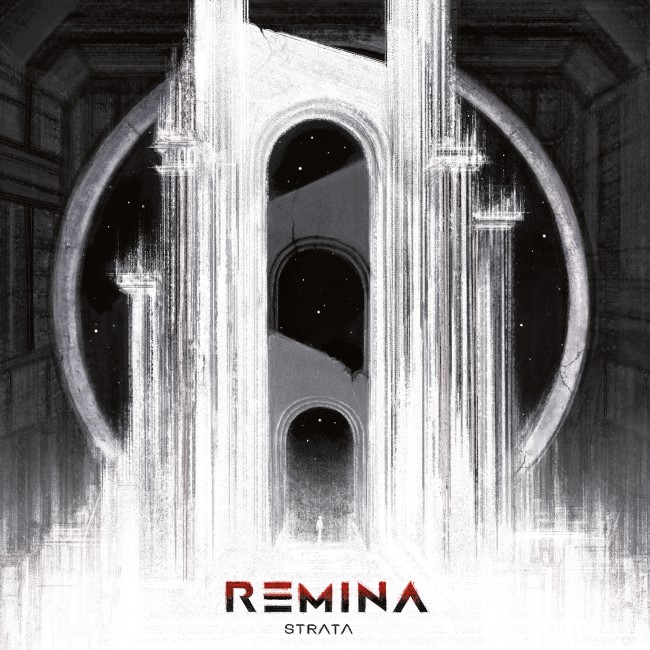
You can support Terra Relicta by donating! Please, do so, and thank you!

A place where melancholy and atmospheric cosmic etherealism met doom has a name - Remina. A new band formed by nobody else than the siren of doom - Heike Langhans and Sojourner's guitar master Mike Lamb. Heike just recently left the gothic/doom masters Draconian with who she recorded two beautiful albums, Sovran (2015) and Under A Godless Veil (2020). She was also a member of the mighty cosmic drone act Ison and has a solo project named :LOR3L3I:. Together the two artists are as well active as Light Field Reverie, who released the magnificent debut, Another World, in 2021. Remina struck the fans of atmospheric doom in November this year with the debut album Strata, released via the Italian label Avantgarde Music. Remina is a magnificent piece of dark, melancholic and melodic sonic art with which Heike and Mike focus on their love of space and sci-fi. Remina’s debut has hints of all the other current and former projects of both musicians, yet sounds like something different and unique. I talked with Heike and Mike about the formation of Remina, their debut album, their existing and ex-bands, and yet much more.
Interview with: Heike Langhans and Mike Lamb
Conducted and edited by: Tomaz
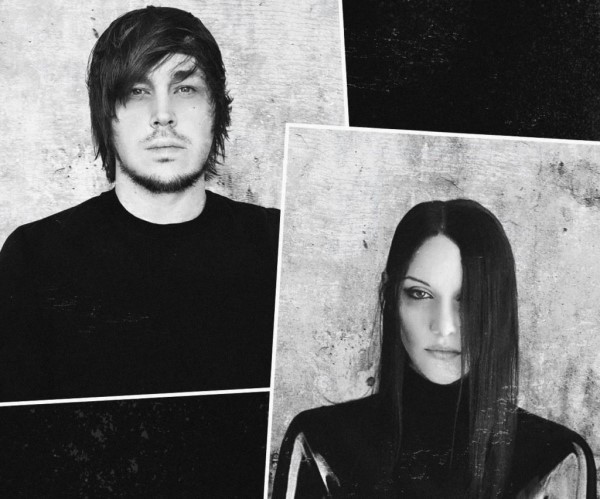 Tomaz: Hi Heike and Mike. First of all, congratulations on the beautiful and soothing yet so strong debut album - Strata. Can you share your emotions about it?
Tomaz: Hi Heike and Mike. First of all, congratulations on the beautiful and soothing yet so strong debut album - Strata. Can you share your emotions about it?
Heike: This album serves as some kind of a token for all things we've wanted to do in music. It's also a zenith and outpouring of thoughts and feelings after isolation and frustration with the pandemic. The best thing about it is that it feels like the beginning of something very special and we're quite excited to keep writing.
Mike: I think it's safe to say that we're both really proud of what we achieved with this album, and it feels so good to have it out there finally. The response has been amazing, we couldn't be more humbled by how people have taken to Strata! For us, this album feels like the culmination of a year and a half where we were forced apart because of bureaucracy and visas, so there's a lot of deeply personal emotional energy fused into those songs.
Tomaz: So, why Remina? There must be a reason. Why not release this under the Light Field Reverie monicker?
Mike: We know it probably seems a bit strange from the outside, on the surface I guess Light Field Reverie and Remina appear quite similar, but it's a little more complicated than that. We've had a few people ask us about this actually, so it's good to get to clarify a little! Light Field Reverie was our attempt to do whatever we wanted to at the time, to be a little bit genre-less in some respects. We're still so proud of that album, but I think it was maybe too unfocused. The doomy elements didn't seem to sit so well alongside the modern elements, the "proggier" elements, and the "gothier" stuff. We seemed to lose some of the doom listeners with the modern elements, and vice versa. So we took the darker side out of the Light Field Reverie equation: the doomy, spacey, atmospheric side and we ran with it to make Remina. Which has been a more focused project with a distinct identity from the start, and I think that has been a massive benefit. Light Field Reverie is definitely still going, we're just embracing the influences we adore, like The Birthday Massacre, Drab Majesty, Unto Others, Vandal Moon and a load of great 80s/90s bands and running with that approach like we had on the title track Another World. So Light Field Reverie will be more geared in that direction going forward, and that song is consistently the most listened to on the album, so it feels like the right decision.
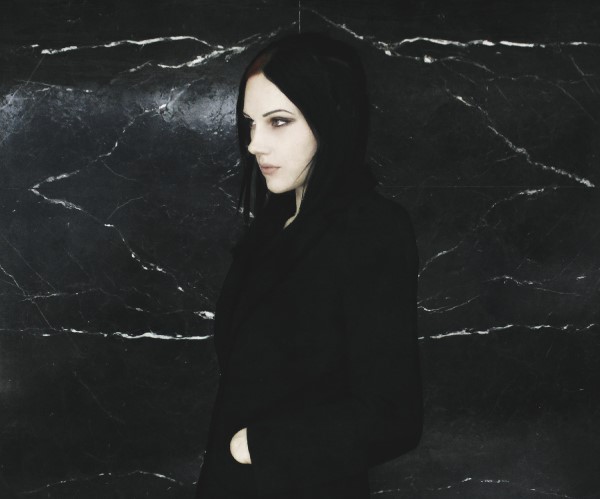 Tomaz: From your words, I can somehow sense that Light Field Reverie is taking a slightly new direction. When can we expect something new?
Tomaz: From your words, I can somehow sense that Light Field Reverie is taking a slightly new direction. When can we expect something new?
Mike: Yeah, something different but perhaps not new or unprecedented, just something more in line with what you heard on the title track of Another World. I guess the closest point of comparison we could make would be The Birthday Massacre, a band very important to both of us. That sort of approach, a kind of modern (but very 80s-influenced) goth sound.
Tomaz: I searched a little bit and found out that the name Remina was used by Japanese author Junjo Ito, in this case, 'Hellstar Remina' is a name for a star-sized living planet that consumes planetary bodies. Any connections with this? How did you come up with the name and is there some special meaning behind it?
Mike: Yeah, we took it directly from Hellstar Remina! Junji Ito is one of my favourite authors, and the masterful way he works with the atmosphere in his stories and art really had a huge impact on us both. So it just made sense to give a nod in his direction, he's been a big influence on me for many years.
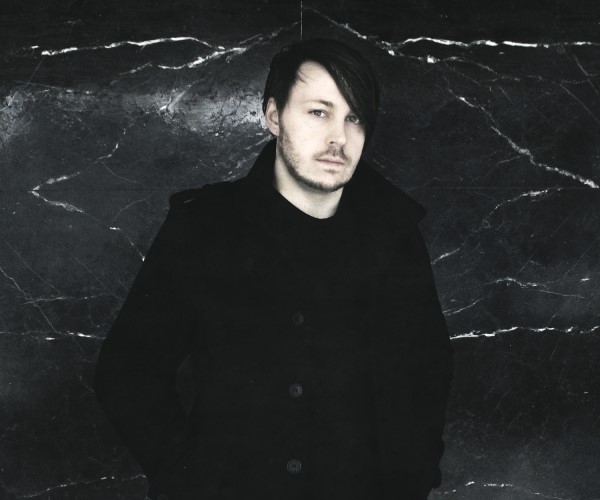 Tomaz: Once again you wrote beautiful deep lyrics, Heike, and while reading them, I find it as a very important thing where the whole Remina meaning comes in front and reveals its inwardness. This sensitivity must be also taken from personal experience, I guess, and there's a deeper meaning. Is there a concept behind them?
Tomaz: Once again you wrote beautiful deep lyrics, Heike, and while reading them, I find it as a very important thing where the whole Remina meaning comes in front and reveals its inwardness. This sensitivity must be also taken from personal experience, I guess, and there's a deeper meaning. Is there a concept behind them?
Heike: It's funny - I have a hard time putting my thoughts into words when asked outright but when writing lyrics, I really just take the time to put thoughts and feelings into a concept that comes across as a story but has meanings that can be applied to many different scenarios. I'm not always trying to talk about my own experience, but rather how anyone would feel in a certain scenario. I want listeners to relate words to their own lives and stories as well. Other times I take straightforward concepts that fascinate me and paint them in very specific words that evoke mental images or feelings. I tend to rhyme with almost everything. There's something about rhymes that creates a rhythm like a heartbeat. Sometimes a rhyme can create beautiful 'aha' moments and really linger in the mind.
Tomaz: Also the front cover artwork seems like it is taken from a cover for a sci-fi book...
Heike: It's more of a tribute to the manga 'Blame!', where machines are left to build continuously and aimlessly into the far reaches of space. The archway on the cover is a colossal structure that seems purposefully built, but in a way that almost makes no sense. It stands in front of a portal into space, but inside the structure it's desolate and broken down, suggesting that civilisation has long since gone as the structure slowly breaks down over an indeterminable amount of time. It's meant to leave an eerie sense of loneliness as the tiny human stands alone on the stairway leading into it.
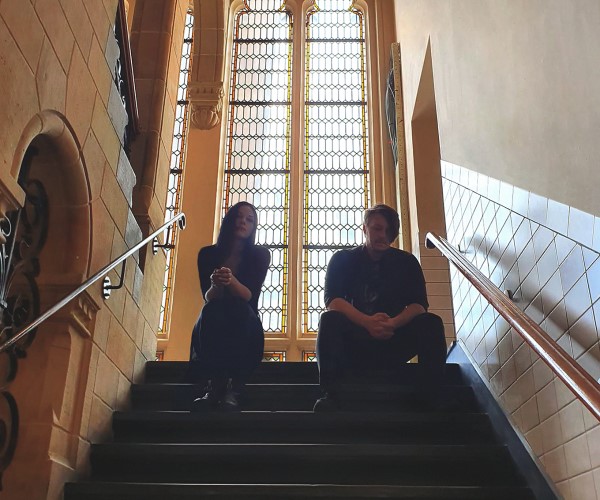 Tomaz: How much does the compositional and recording process differ between Remina and Light Field Reverie?
Tomaz: How much does the compositional and recording process differ between Remina and Light Field Reverie?
Mike: Honestly there isn't a lot of difference between either, since it's essentially Heike and I doing our usual thing. We both work together, cultivating the song and recordings until we're happy and then I mix and master the final product! The biggest difference would be in the mindset while making them: with Remina we keep a very tight focus on maintaining a spacey, atmospheric approach to it all; whereas with Light Field Reverie, we tend to approach it with a more broad brush and don't try to enforce a particular aesthetic or overall atmosphere.
Tomaz: Do you initially build the songs on synth-laden atmospheres, vocal lines or guitars? I see that these three factors are the central thing around which everything else resolves.
Mike: We typically start out with either the main thread of a melody instrumentally or something with a strong sense of atmosphere, but it changes from track to track. For example, "Icarus Signal" was entirely sparked by the sound design of the initial pulsing synth you hear at the very start, which then carries through the entirety of the song more or less. "The Endless City" started with trying to capture the sound of unfathomable miles of metal structure creaking under its own weight, reaching out in all directions from earth into Space. Whereas "Back In Time" began with the odd push and pull of the effected piano melody that comes in at 2:08, and we built both backwards and forwards from there. So it all sparks from different places. Sometimes a seed idea, or sometimes us sitting down to write with a specific intention. Those elements you mention are definitely the core of what we build a song with, so once we've started the idea with the initial seed those are where we look to build first, along with drum patterns of course, which are vital to the overall identity of the song. The one thing about Remina that is different from the usual approach for us is that I use the guitar elements more as a layer and supporting element, I never think of Remina as a "guitar band". Maybe in the future, I'll add more riffs and guitar-focused parts, but I see the band as a vehicle to carry Heike's vocals and to capture that cosmic, sci-fi atmosphere first and foremost.
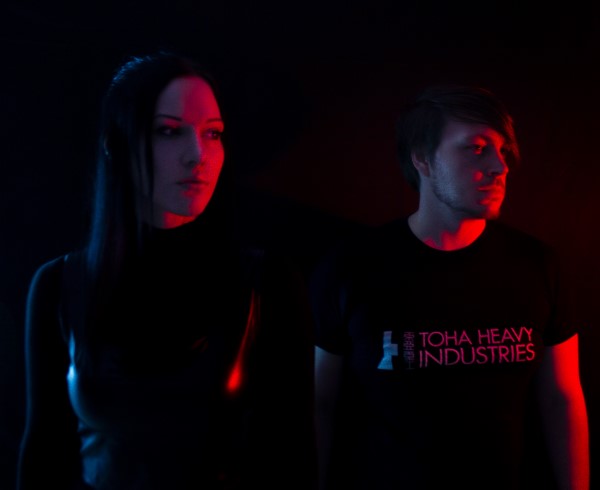 Tomaz: Can you please reveal where can your fans expect to see you playing live? Any plans for a proper tour?
Tomaz: Can you please reveal where can your fans expect to see you playing live? Any plans for a proper tour?
Mike: Right now the only show we have booked is Stella Nomine in Germany next August. We'd have to see what came up in terms of offers, but we'd definitely consider a tour or more shows, it's really just down to what comes along!
Heike: Personally I'd be happy doing weekend shows over tours. The tours I've been on have not been something I'd want to do too often. It might be a product of social anxiety, i.e. finding it hard to be in 12 people's personal space for weeks on end. Or perhaps just the need for freedom to spend more time in places after gigs. We love to travel and experience food and culture, but often the touring experience is a non-stop rush and takes a toll fast. I believe part of the beauty of being able to go play for foreign audiences is getting to spend time in those countries too! If our first show goes well and we feel we're ready for more, we'd happily accept more offers.
Tomaz: The album Strata was released via the Italian label Avantgarde Music. Probably a logical way since also Light Field Reverie released the album there. I suppose that you must be satisfied with the label.
Mike: Absolutely, Avantgarde treats their artists with respect and they are so supportive. I first worked with them back in 2014 for the release of our Sojourner album Empires Of Ash, and since then they've been my go-to label whenever possible. Rob and Andrea are just genuinely great people, so we're very happy there. Avantgarde also has a fantastic roster!
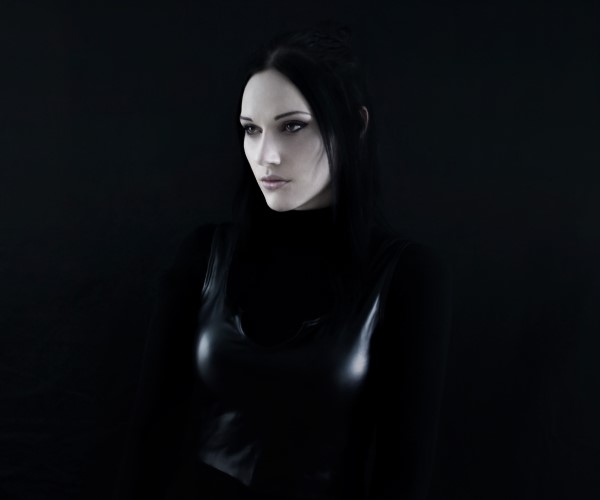 Tomaz: Mike, what's going on with your "main" band Sojourner? Is anything new in the making?
Tomaz: Mike, what's going on with your "main" band Sojourner? Is anything new in the making?
Mike: I needed a bit of a break for a while there, I worked on nothing but Sojourner from 2014 until Covid hit in 2020 and slammed the brakes on everything we were doing... I recorded all of the guitars and peripheral instruments on those first three albums, and we were starting to pick up steam on the live front, but I just generally did nothing but Sojourner for a long time without any breaks. I guess I kind of burned out on it, and there was some internal personal upheaval which kind of affected things in terms of how I felt about it all for a long time. I guess I just needed some time off more than anything. I put together the Perennial EP in 2021 which seemed to go down well, and now I've finally been working on the beginnings of a new album over the last couple of months! It's shaping up well so far, pretty much a continuation of where we were heading on Premonitions but with a little bit more of a nod to the first two albums. There will be some new elements that I want to fit in there too, but if we're going to do more Sojourner I want it to be true to the spirit of the band we started.
Tomaz: Heike, you made a name for yourself by being a part of Draconian on their last two albums. Your voice certainly added that necessary surplus in broadening the atmosphere and sensitivity to their music. When I heard the news I couldn't believe it was true. So, what was the reason that you left the band?
Heike: The pandemic situation caused me to have to return home to South Africa for a while and I ended up having to make a lot of changes to my life plans. I wasn't sure if I wanted to return to Sweden or when, because the bureaucracy made it difficult for Mike and I to both be able to live there. The band needs someone who can be there to rehearse with all the upcoming plans they had for shows, and I was going in a different direction in my own life. Apart from that, I realized after 10 years of being in bands where I only sing and did not write as well, that I wanted more out of my career. I enjoy writing music and lyrics alongside singing, so it felt like a good time to make that my central focus. Draconian offered me a great opportunity to grow and expand my platform and I'll always be very grateful for that.
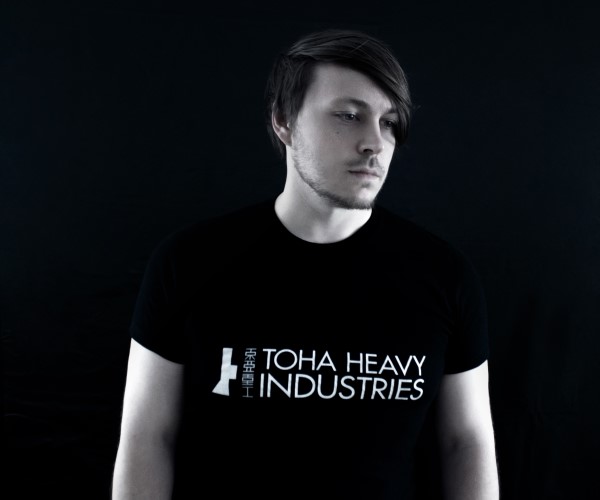 Tomaz: The last shows that you played with Draconian were something special, weren't they? Both, you and the new/old singer Lisa Johansson performed together. Please tell me more about this experience.
Tomaz: The last shows that you played with Draconian were something special, weren't they? Both, you and the new/old singer Lisa Johansson performed together. Please tell me more about this experience.
Heike: I'd say playing Hellfest 2022 and being able to sing alongside the original singer is the best possible farewell I could have asked for. My last show before that was well before the pandemic, so I would be lying if I said I wasn't nervous to go onstage two or more years later at one of the biggest festivals in the world! It was really great to hang out with Lisa leading up to the show as well as when we did our photoshoot. I felt very comfortable handing back the torch to the very singer who made me fall in love with Draconian's music, to begin with, and I'm always in awe at how powerful her voice is.
Tomaz: You also did some guest appearances. If I'm not mistaken the last one was with Italian doomsters (Echo). How much importance does this mean to you, and what are your criteria to accept such invitations?
Heike: (EchO) is great and highly underrated in my opinion, so check them out. I made their acquaintance through Mike and met some members briefly during our tour with Draconian and Sojourner. The moment they asked, I didn't hesitate, because good doom is a joy to sing on and good people are a joy to work with! These days I don't do that many collaborations, because I have so many music and art ideas to finish. Mike and I have such a massive backlog of ideas we need time to manifest, but every now and then I'll put time aside for friends or serious offers. My days of doing quick favours are over I'm afraid! From a practical standpoint, it's just impossible to keep up with everything otherwise.
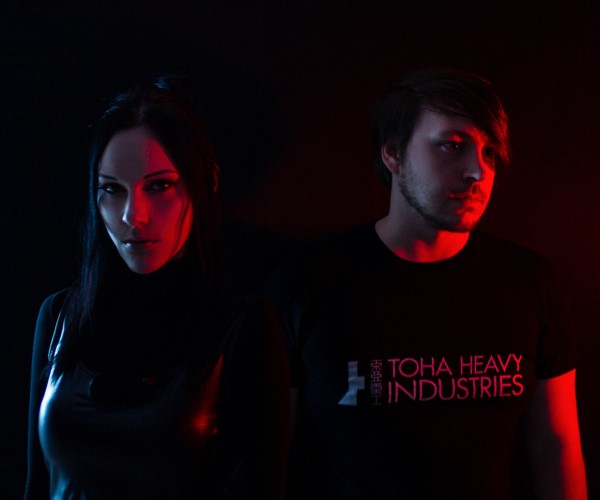 Tomaz: Back to Remina. I know it's maybe too soon to ask but what are the future plans with Remina? I hope that it's not just a "one album" project.
Tomaz: Back to Remina. I know it's maybe too soon to ask but what are the future plans with Remina? I hope that it's not just a "one album" project.
Mike: Definitely not only one album! Remina is a long-game project for us, so we're really working at cultivating the future of the band. We're currently working on new music for next year, both the follow-up album and an extra special collaboration that we're really looking forward to releasing. We're really focusing on Remina, so there's plenty more coming.
Heike: In fact, we already have enough material for another album, but of course, we have to pace ourselves and let the album cycle run its course. Besides that, we have more music to finish with Light Field Reverie and my solo project :LOR3L3I:, so it's all just a matter of time management really!
Tomaz: How important do you think is for a band like Remina or Light Field Reverie, to be present on social media as much as possible? Is this the way that you keep your connection with fans?
Heike: Mike is very much to thank for taking such good care of our social media presence. I tend to focus more on creating visuals or the Instagram layout and while I work on that, he will read comments and messages to me so I can somewhat partake in keeping up with responses and requests. Personally, I get distracted very easily on social media, so I try to limit myself and go respond only when I have free time, but as he mentioned, it can be very taxing time-wise when it's just the two of us! I have also started a Patreon recently where I can be more present with fans and engage on a level I don't usually on social media!
Mike: Social Media is definitely an integral part of a band's existence these days, for better or worse. We absolutely love talking to fans and making sure we cultivate that connection, it's really important for us to have the personal element. The downside of it is that it takes a lot of time and a lot of energy. When it's only the two of you, no management or other external element, music making and creativity definitely suffer because of it...but the element of making time to thank and talk to people as much as possible is a pretty important aspect to us. Sometimes I sit down to go through the various platforms and emails, and the hour I set aside turns into 2-3 hours very quickly if there's enough to reply to that day. I'm still trying to work out how to manage it all and keep doing music and keep from burning out all at once. I feel like if people give us their time for the music and leave us comments though, we owe them our time. It's a simple give and takes, and the kindness and passion of people mean the world when you're creating art because not everybody is lucky enough to receive that attention. So you've got to give back where you can.
Tomaz: Thank you very much for taking your time with answers and explaining many background things about Remina and more. Is there something that you would like to add at the end of this interview?
Heike: It's great to be chatting with you again and thanks to everyone who has read up to this point! It means you didn't get bored of us haha!
Mike: Thank you so much for the interview, and thank you so much to everybody that takes the time to listen and chat with us, you're all amazing.
Remina links: Facebook, Bandcamp, Instagram, Avantgarde Music
